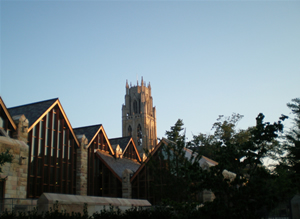Shared Faith
The Sewanee Writers’ Conference convenes for its twenty-fourth annual gathering of writers
July 19, 2013 The annual Sewanee Writers’ Conference will kick off its distinguished lineup of readings on July 23, 2013, with National Book Award winner and three-time Pulitzer Prize finalist Alice McDermott. During its twenty-four-year stretch of summer conferences, Sewanee has become woven into the fabric of Tennessee’s literary tradition, bringing highly regarded authors together with emerging writers for twelve days of readings, lectures, panel discussions, and intensive workshops. Among this year’s stellar roster of nationally recognized and award-winning fiction writers, poets, and playwrights are Tim O’Brien, Elizabeth Spencer, Christine Schutt, Mark Strand, Claudia Emerson, Robert Hass, Richard Bausch, Tony Earley, Randall Kenan, Jill McCorkle, Andrew Hudgins, Erin McGraw, Steve Yarbrough, Daisy Foote, and Dan O’Brien.
 The Sewanee Writers’ Conference is one of the most respected writers’ conferences in America, providing a high-spirited, challenging atmosphere in which to engage with fellow writers. Set among the woods and stone buildings of the University of the South’s campus, the conference offers an atmosphere that lends itself to imagination and reflection. In an essay for Chapter 16, Maria Browning described her experience at the conference in 2011, which began as an exciting barrage of writing advice that slowly settled into a potent internal hum:
The Sewanee Writers’ Conference is one of the most respected writers’ conferences in America, providing a high-spirited, challenging atmosphere in which to engage with fellow writers. Set among the woods and stone buildings of the University of the South’s campus, the conference offers an atmosphere that lends itself to imagination and reflection. In an essay for Chapter 16, Maria Browning described her experience at the conference in 2011, which began as an exciting barrage of writing advice that slowly settled into a potent internal hum:
As the days went by, I came to recognize what I felt as devotion, a beckoning to the soul. I was with a group of people doing a small, deeply human thing—shaping language to convey something about what it means to be alive—and most of them were committed to doing the work for its own sake. Yes, of course, every writer wants to be published and read, and precious few people object to making money, but I know I will go on loving and struggling with words regardless of worldly reward, and it seemed that a lot of the people around me at Sewanee felt the same. In their company I had a sense of shared faith.
When I attended Sewanee in 2012, I understood just what Browning means. A central concern of my life as a writer has been to pursue greater receptivity, a greater willingness to challenge what I think I know about my aesthetic approach and discipline and, if need be, to start again. Sewanee provided that challenge, in spades. At the time, I was eager to join the piquant atmosphere of high spirits that can help to make writing conferences exciting, inspiring experiences that fuel our work after we return home. In my case, however, Sewanee was not so far from home, and that proximity turned out to be one of its greatest pleasures. As a native Tennessean, I had spent years traveling long distances whenever I could, landing in writing programs and conferences that sometimes felt like curious alien planets I was observing from a safe distance. Sewanee gave me the chance to meet the writer tribe on my own land. Perhaps then I was free to travel further inward and then to reflect honestly about the direction my writing needed to go. As a result, I gained a clearer fix on my own literary turf, and my point of view as a storyteller and craftsperson has matured.
Sewanee occupies a significant place in my own writing life and in Tennessee’s literary landscape. This year’s offerings promise to uphold that distinctive tradition. For the full schedule of Sewanee Writers’ Conference readings and lectures, click here.
For more updates on Tennessee authors, please visit Chapter 16’s News & Notes page, here.